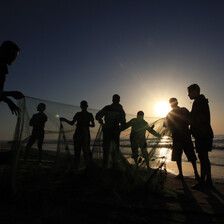The Electronic Intifada 10 October 2024

The destruction of Gaza’s economy means that fish is unaffordable for most of the Strip’s residents while fishing is a potentially fatal undertaking.
APA imagesEvery day, we encounter small details in life that may seem ordinary, but in certain moments turn into living lessons that reshape our understanding of the value of blessings.
On 11 August, the sky was gray, and the waves of the sea crashed with restless intensity. I was waiting for my first taste of fish in nearly a year.
Instead, I found myself in the heart of a story full of danger and challenge.
Two days earlier, I had been craving fish. WIth barely any fresh food anywhere in Gaza, prices have spiked, and fish was simply too expensive in the markets.
But my father, who never knows defeat, decided he would risk his life to catch fish for his family. He called a friend, rented a fishing rod, and went with that friend, who has fished all his life, to the sea.
On the day, however, we lost connection for more than five hours. The phone network in the Sudania Sea area – an hour’s walk from al-Nasser district of Gaza City where we live – was down, as is normal these days.
We became anxious, but my father eventually returned home. When he did, however, I noticed a gash on his leg.
I asked him what had happened, and he said he fell while walking. I knew he wasn’t telling the truth. I knew he was just trying not to worry us.
My father rarely lies, but when he does, he rolls his eyes and looks right and left. When he did this with me that day, I knew he wasn’t telling the truth.
When I asked him if he was sure he was telling the truth, he smiled slightly and that was when I was certain he was lying.
Finally, he told us the truth
Thoughts of death and fish
He and his friend had pushed a little out to sea on a wooden board in order to get to a more promising area for fishing when they were suddenly fired upon. They jumped into the water and swam toward the shore and hid behind a rock.
Five shells were then fired at the shore with one hitting a rock less than a yard away from my father. It was the shrapnel from this that had injured his leg. The shelling continued for what seemed like half an hour, my father told us. But, in a moment of calm, he and his friend had made a run for it.
I asked him what thoughts had crossed his mind at that moment.
He said the first thing that came into his mind was the thought of dying. He said his prayers. But then he remembered he had promised me fish.
“It’s your favorite food, and you haven’t had it in 10 months. Then I thought about your mother, your siblings and your future, and how you would live without me.”
He prayed again, he said, for survival.
“I didn’t want to leave you, but if I did, I prayed for your well-being and for peace to reign in our home. I repeated the martyrdom declaration again, but I didn’t die and returned to life.”
That night, I couldn’t sleep. I felt guilty. My father went to the sea for me. If he had been martyred, I would never have forgiven myself.
At 3 am, my father woke up to get some water and found me still awake.
“Why aren’t you sleeping?”
I replied, “Dad, don’t go again. Yes, I miss eating fish, but you are the most valuable thing I have, and I don’t want you to risk your life. I can’t lose you.”
“And you are the most valuable thing I have,” he replied.
At that moment, I realized how lucky I was to have my father by my side, which brought me deep comfort.
A week later, my father’s friend returned to the sea, caught some fish, and brought half of his haul to our house.
It was the first time I ate fish since the Israeli genocide began.
Lessons learned
One of the greatest lessons I have learned during this war is the value of the things we had but lost.
Whoever has a home and a roof over their heads, whoever has water and doesn’t have to travel great distances to secure it, whoever sleeps in safety with their family beside them, whoever has a bed and a blanket to comfort them, should thank God for these blessings.
These are not simple blessings; the number of those who don’t have them multiplies every day in Gaza.
The wound on my father’s leg wasn’t just an injury. It was a symbol of deep parental love, moments of fear and profound thoughts. The story my father told wasn’t just about a difficult experience but a testimony to the power of love and safety on the human soul, and the life lessons we learn when facing difficult times.
That night, I realized that things we take for granted, such as family and safety, are the greatest treasures we possess.
The greatest lessons often come from the most difficult experiences.
In Gaza, where the reality means there is neither safety nor comfort, the value of these blessings grows stronger in our hearts every day.
Nada Hamdouna is a writer and translator in Gaza.




